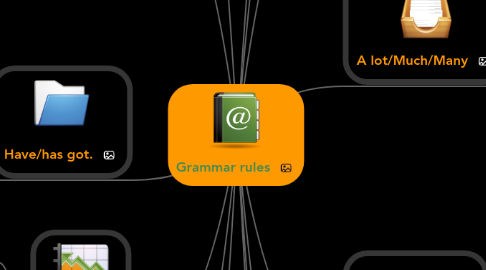
1. Present perfect.
1.1. Past participles.
1.1.1. Been=came back.
1.1.2. Gone=stayed there.
1.2. Have/has+the past participle.
1.3. Experiences in the past, not exactly when.
1.4. Often use ever in questions.
1.5. Often use never, used with affirmative form.
2. Present continuous.
2.1. Present simple of to be+verb+-ing form of the verb.
2.2. Use.
2.2.1. Things happening now.
2.2.2. Things happening around now.
2.2.3. Not usually stative verbs.
2.3. Present continuous.
2.3.1. Now.
2.3.2. These days.
2.3.3. At the moment.
2.3.4. Today.
2.3.5. Yhis week/month/year.
2.4. Present simple.
2.4.1. Describing a habit or routine.
2.4.2. Usually.
2.4.3. Often.
2.4.4. Everyday.
2.4.5. Once a week.
2.4.6. Never.
3. Have/has got.
3.1. No auxiliary do/does with have got.
3.2. Have got: appearance, possessions and relationships.
3.3. Have: possession, family and appearance.
3.4. Have got: spoken and informal English. Have instead of have got in American English.
3.5. Have got: usually not in the past simple.
4. Past Simple.
4.1. In the past.
4.2. When it happened.
4.3. Often with time expressions
4.4. Question: When...?
5. Should.
5.1. Modal verb.
5.1.1. No third person -s.
5.1.2. No 'to' before the verb.
5.1.3. Negative with 'not' (n't).
5.1.4. No auxiliary 'do' in questions.
5.2. Give advice.
6. Definite 'the' or no article.
6.1. Ø
6.1.1. Continents.
6.1.2. Countries.
6.1.3. States.
6.1.4. Towns and cities.
6.1.5. Places in towns and cities.
6.1.6. Lakes.
6.1.7. A single mountain.
6.2. The.
6.2.1. Deserts.
6.2.2. Seas.
6.2.3. Oceans.
6.2.4. Rivers.
6.2.5. Plural names or groups of places.
7. -ing form.
7.1. Most verbs add -ing.
7.2. Verbs ending in consonant+vowel+consonant, double the last letter of the verb and add -ing.
7.3. Verbs ending in -e, delete the final e and add -ing.
8. Countable nouns.
8.1. You can count these.
8.2. Singular and plural from.
8.3. Indefinite article (a/an)
8.4. Numbers.
8.5. An onion, two onions.
9. Uncountable nouns.
9.1. You cannot count these.
9.2. Singular with no plural form.
9.3. Definite or no article.
9.4. You cannot use these with a/an or numbers.
9.5. Water, not two waters. Pasta, not two pastas.
10. A lot/Much/Many
10.1. Quantity.
10.2. Countable nouns.
10.2.1. A lot of: affirmative and negative sentences and questions.
10.2.2. Many: negative sentences and questions.
10.2.3. Many: not usually in affirmative sentences.
10.3. Uncountable nouns.
10.3.1. A lot of: affirmative and negative sentences and questions.
10.3.2. Much: negative sentences and questions.
10.3.3. Much: not usually in affirmative sentences.
10.4. How much/many.
10.4.1. Ask about quantities.
10.4.2. How much+uncountable nouns.
10.4.3. How many+countable nouns.
11. Some and any.
11.1. Some
11.1.1. Affirmative sentences.
11.1.2. Plural nouns.
11.1.3. Uncountable nouns.
11.2. Any
11.2.1. Uncountable and countable nouns.
11.2.2. Negative sentences.
11.2.3. Questions.
11.2.4. Ask and offer things.
